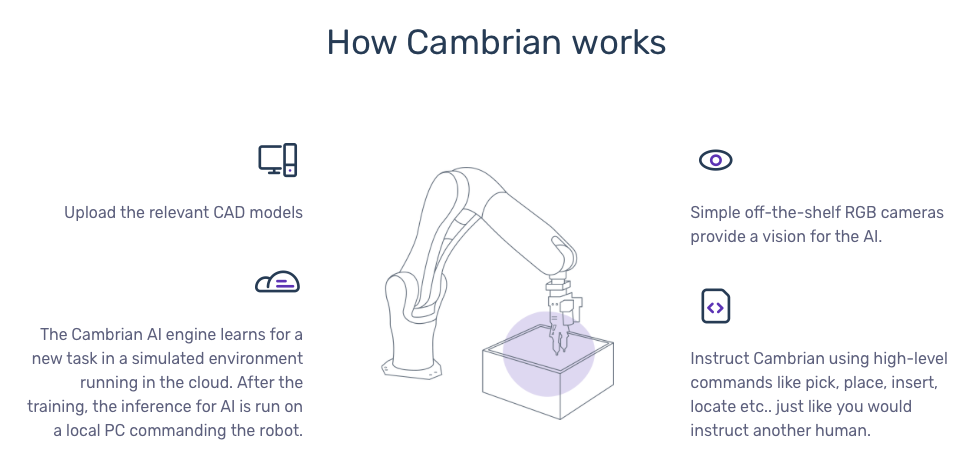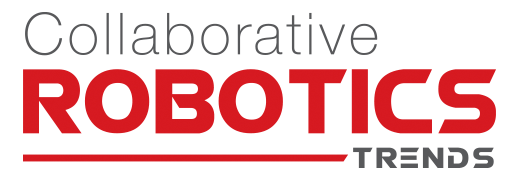
Editor’s Note: Oliver Mitchell is a Venture Partner at ff Venture Capital. Cambrian Intelligence is a portfolio company of ff Venture Capital.
Computer vision is a defining element of intelligent machines transforming mechanical movements into dynamic workflow. Realizing the importance of artificial intelligence for Industry 4.0, my investment firm, ff Venture Capital, partnered with NYU’s Tandon School of Engineering to create an AI accelerator program in 2016. In April 2017, the accelerator, NYU/ffVC AI NexusLab, graduated its first cohort.
One of the standouts, which in full disclosure is now part of ff VC’s portfolio, is London-based Cambrian Intelligence. Earlier this year, I caught up with Cambrian’s founder, Miika Pera, on his firm’s progress in applying its AI imaging platform to collaborative robot arms.
“The vision that I have is that with deep integration of AI to robotics, we can gradually start making all physical matter around us programmable, meaning all supply chains from manufacturing to mining from hospitality to medical and food,” Pera said. “In essence, we’re building technology for the world where everything will be made by robots. Currently, everything around us has been built by human hands in some way or another and if we’re smart enough we can automate that – but the robots need intelligence to replace human hands and arms in any repetitive or non-repetitive tasks.”
The engineer imagines a future whereby any designer, anywhere, could “just upload a CAD design of a new product, to a factory full of intelligent robots and the product just gets made without any human intervention and, of course, at a low cost.”
How Cambrian Intelligence’s system works
To accomplish the lofty goal of enabling smart manufacturing through today’s installed base of cobots, Cambrian Intelligence is infusing off-the-shelf sensors with its full-stack platform.
“Our AI, which is a giant neural network, receives input from the cameras and outputs the part locations, orientations and how they should be grasped with the current gripper type. Our software then guides the robot to do the picking,” Pera described. He stressed the camera module is “just two off-the-shelf industrial RGB cameras in a stereo configuration.”
The startup’s intellectual property is its software that turns the sensors into virtual eyes that perceive the working environment in three dimensions, versus existing two dimensional solutions on the marketplace.

“Imagine you’re a manufacturer and you have part A and part B in a chaotic bin and you’d like to install the A into B and then pass it forward in the assembly line,” illustrated Pera. “With Cambrian setting up for these kinds of tasks, it takes just minutes and you’re good to go. There is no learning on the real robot, after training it just works out of the box.”
According to Pera, Cambrian Intelligence’s solution is a game-changer for his clients, large European manufacturers, and is adaptable to all the leading robot arms, including ABB, KUKA, and Universal Robots.
Intelligence to fuel growth of cobot industry
Cambrian Intelligence is part of a larger story about the growth of the cobot industry, which is projected to exceed $24 billion annually by 2030. Rian Whitton of ABI Research projects, “The hardware innovation is still trailing behind, and most of the value related to cobots does not come from collaboration. It comes through ease-of-use, re-programmability, lower total cost compared to industrial systems, and re-deployability. In essence, the value is one of lowering barriers rather than building entirely new use cases for robots. What is more, cobots still trail industrial systems in speed, performance, and payload, which will have to change if adoption is to continue at this feverish rate.”
Whitton estimates software systems could account for half of cobot revenues, climbing from its present value of $558 million to $10.6 billion in 2030. Universal Robots owns the majority of global marketshare.
Cambrian is part of a new class of cobot software companies leveraging deep learning to tackle specific tasks. “Our current customers are manufacturers in the electronics and automotive industries,” Pera detailed. “For example, the body shop of an automotive factory is almost fully automated, but the automotive assembly is not automated at all.”
He explained how Cambrian Intelligence is expanding its task library. Today it is able to automate 10-15% of manual labor, but within five years Pera claimed its software will be able to do 70-80% of manufacturing tasks that are currently done by hand.
“Enhancing cobots with more intelligence will actualize much higher growth rates for the cobot sales as they will be quicker to set for a new task and manufacturers can use them for more tasks,” Pera said.


Leave a Reply
You must be logged in to post a comment.